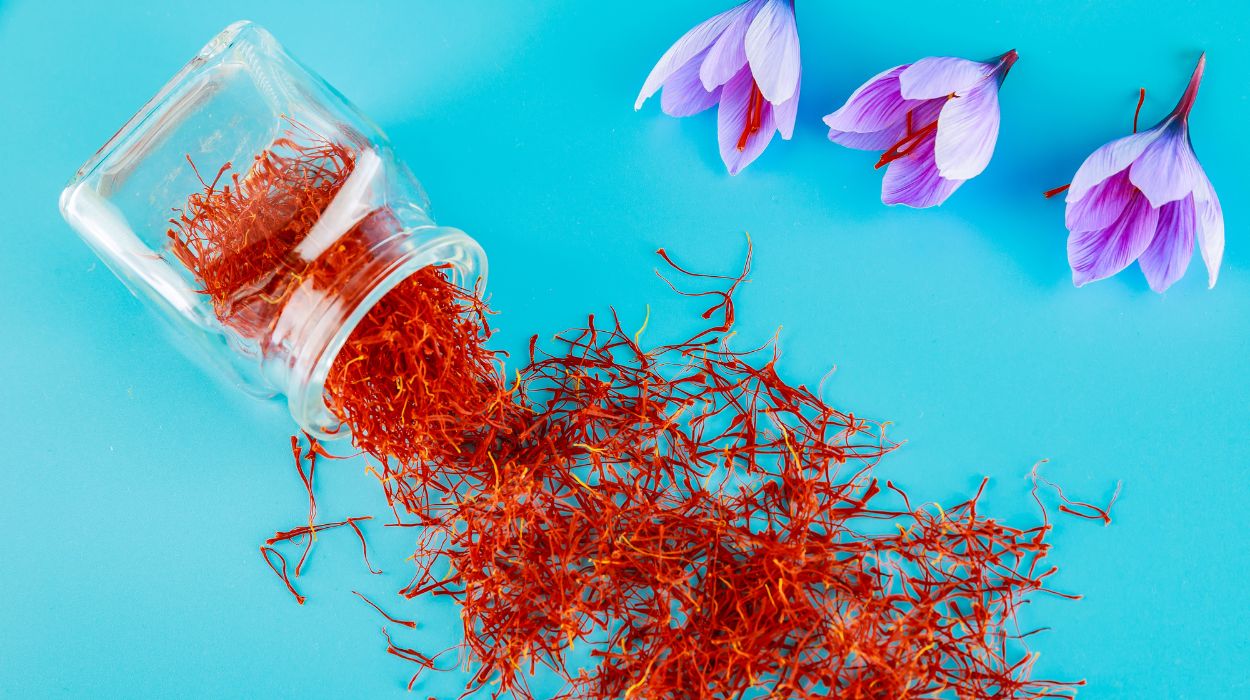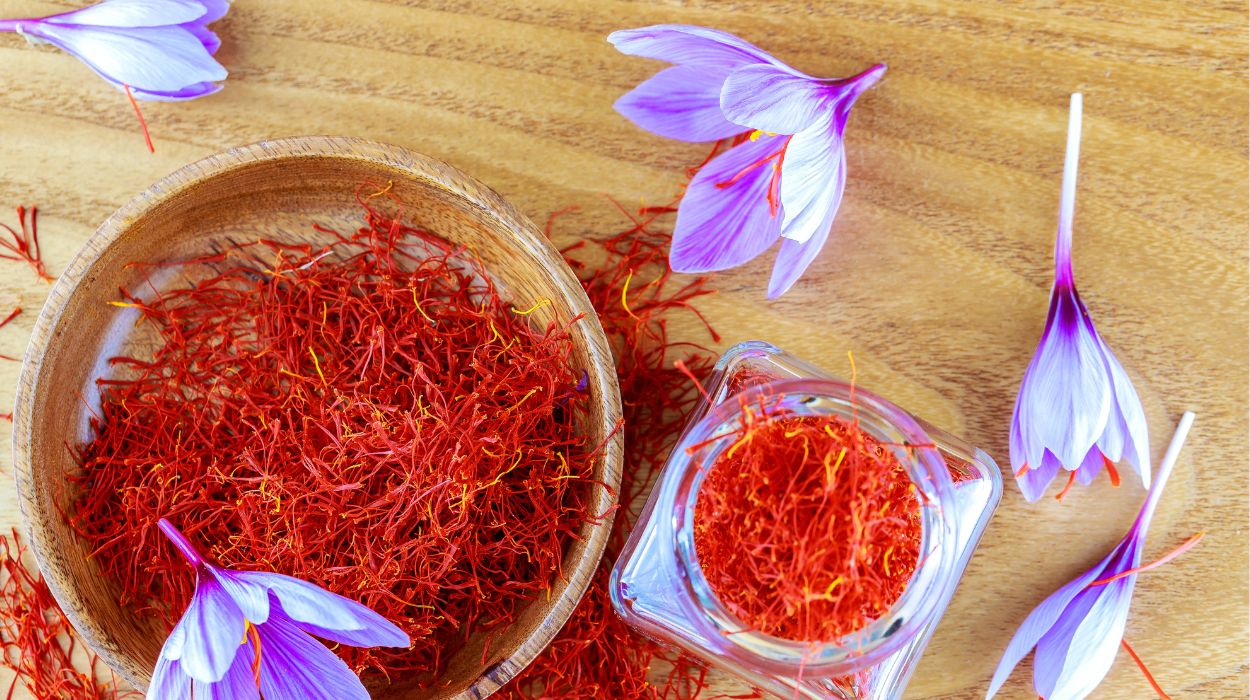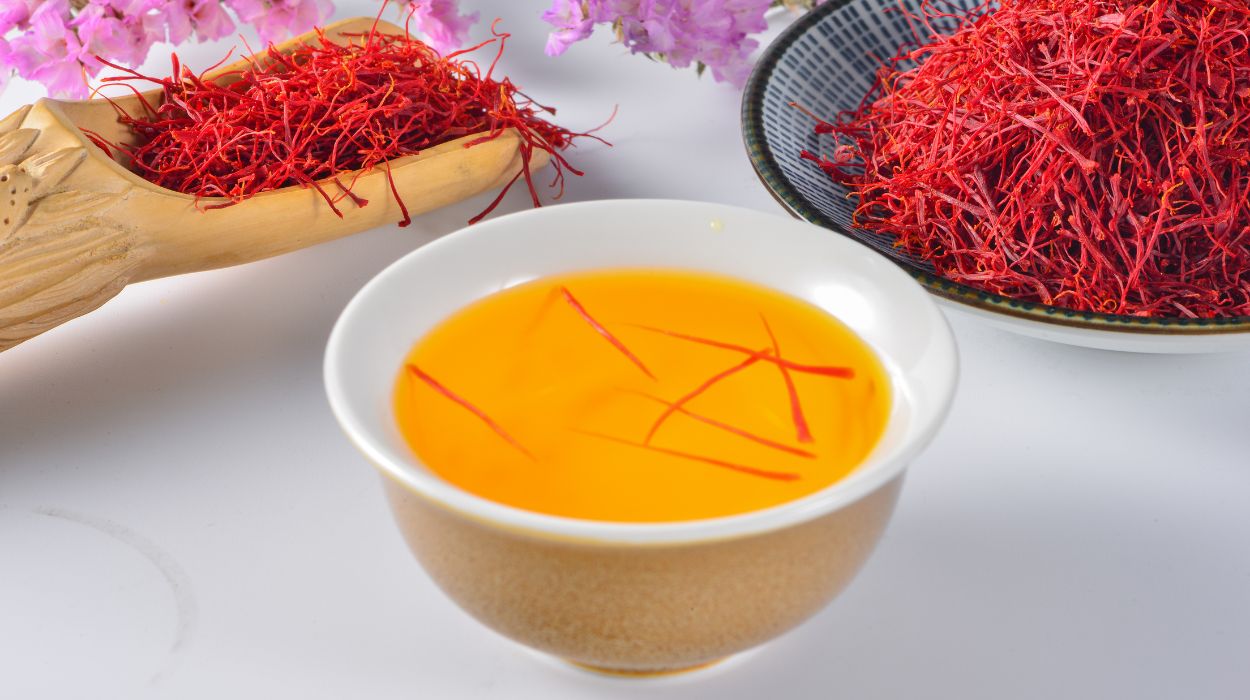 Expert's opinion
Expert's opinion
Expert's opinion
The article is a subjective view on this topic written by writers specializing in medical writing.
It may reflect on a personal journey surrounding struggles with an illness or medical condition, involve product comparisons, diet considerations, or other health-related opinions.
Although the view is entirely that of the writer, it is based on academic experiences and scientific research they have conducted; it is fact-checked by a team of degreed medical experts, and validated by sources attached to the article.
The numbers in parenthesis (1,2,3) will take you to clickable links to related scientific papers.
Saffron Benefits, Nutrition, Side Effects & How To Use In 2024

Saffron is one of the most valuable spices in the world. The health benefits of saffron are widespread, and it has been used for centuries in cooking famous dishes, like Iranian steamed saffron rice, and for its medicinal properties.
Saffron is made from the dried stigmas of saffron crocus flowers. The stigmas are the threads that grow inside the flower and connect to the ovary. They are carefully harvested by hand and then dried. Below are some of the many saffron benefits for health, including benefits for skin, pain, depression, and much more.
Amazing Benefits Of Saffron
- Better for the skin.
- Infection management.
- Benefits for mental health.
- Pain relief.
- Immunoregulatory.
- Cancer prevention.
Health Benefits Of Saffron
Whether you want an amazing, all-natural beauty product, enhanced vitality, and well-being, there are many amazing saffron benefits for skin and overall health. Below are some of the best-researched saffron benefits to your health.
Better For Skin
Evidence[1] shows that saffron has health benefits for the skin due to its:
- Antioxidant properties: Antioxidants scavenge harmful free radicals, and harmful molecules around us that can damage cells, leading to wrinkles and other signs of aging.
- Anti-inflammatory properties: This can help to reduce redness, swelling, and irritation.
- Immune-boosting properties: These properties can help to protect the skin from infections and other environmental stressors.
- Depigmenting: If you suffer from age spots or other skin pigmentation issues, saffron may be able to help lighten the skin.
- Repairing: Like other organs in the body, skin cells need to be repaired and replaced on a regular basis. Saffron may help to stimulate the production of new skin cells.
- Soothing: Saffron may help to soothe irritations such as eczema, psoriasis, and other skin conditions.
Because of its many medicinal properties, saffron is often found in moisturizers, face masks, soaps, and other beauty products! You can also make your own tea mask using saffron, sugar, olive oil, and milk.
Infection Management
New studies[2] have shown that saffron may help manage the symptoms of COVID-19 in severe cases. Saffron has also been traditionally used to help treat other respiratory infections such as bronchitis, colds, and the flu, in ancient medicine.
In a randomized controlled clinical trial, these studies show that saffron’s antioxidant and anti-inflammatory properties can help reduce the symptoms of these respiratory infections. Saffron may also help to boost the immune system, making it easier for your body to fight off these infections.
Benefits For Mental Health
One of the most well-studied saffron health benefits is its ability to act as an antidepressant. Depression and major depressive disorder are serious mental health conditions that can lead to a wide range of other problems.
Studies[3] have shown that saffron may be as effective as some prescription anti-depressants in certain cases for people with mild to moderate depression symptoms, and with fewer side effects.
In a placebo-controlled clinical trial, these studies showed that those who received doses of saffron had more reduced symptoms than those using a placebo, including enhanced memory and spatial learning. These studies are very promising for those suffering from depression.
Saffron may also help to improve cognitive function and memory, especially in older adults. Studies[4] show that saffron supplementation used in randomized clinical trials can help people with mild cognitive impairment MCI), and moderate Alzheimer’s disease. While saffron isn’t the end-all-be-all for these conditions, it may help to improve symptoms and quality of life when used in conjunction with a holistic plan.
While saffron has the potential to support mental health, it should not be used as a substitute for prescription medicine. If you are struggling with your mental health, speak to your doctor for individual guidance.
Pain Relief
Studies[5] have shown that rats taking saffron supplements had significant reductions in their neuropathic pain levels. Neuropathic pain can be caused by a wide range of conditions, such as diabetes, cancer, shingles, and more.
While more research needs to be done on humans, these studies show that saffron may help to reduce pain levels for those suffering from neuropathic pain.
Immunoregulatory
Your immune system is responsible for fighting off infections and keeping you healthy. A strong immune system is essential for good health, but an overactive immune system can lead to autoimmune conditions such as allergies, asthma, and more.
Saffron has immunoregulatory properties, which means it can help to regulate the immune system. Studies[6] have shown that saffron can help to reduce immune disorder symptoms from allergies, asthma, and more. These benefits are due to their strong anti-inflammatory effects.
Cancer Prevention
Cancer is a serious disease that can be caused by a wide range of factors, such as genetics, lifestyle choices, and more. Cancer is a leading cause of death worldwide, so anything that can help to prevent it is important.
Fortunately, studies[7] have shown that saffron benefits also include tumor-fighting properties. Saffron has the potential to prevent the development of cancer cells and tumors, according to these studies.
Studies have shown that saffron can help to improve the side effects of cancer drugs, making treatment better and more bearable for patients in desperate need of help.
Saffron Nutrition Value

Saffron is loaded with certain vitamins and minerals,[8] including
- Vitamin C: 80.8 mg
- Calcium: 111 mg
- Magnesium: 264 mg
- Phosphorus: 252 mg
- Potassium: 1720 mg
- Sodium: 148 mg
- Zinc: 1.09 mg
- Copper: 0.328 mg
- Manganese: 28.4 mg
If you want to get more nutritional benefits, it’s best to opt for supplements to experience saffron benefits for female and male health.
Potential Side Effects Of Saffron
Most people don’t use enough saffron to experience any side effects. However, it’s possible to experience an allergic reaction to saffron if you’re sensitive or allergic[9] to saffron. Respiratory allergic reactions have been reported in people who have immediate skin reactions to saffron. These allergic symptoms include:
- Itching
- Hives
- Rash
- Wheezing
- Difficulty breathing
If you experience an allergic reaction after consuming saffron or its pollen, it’s important to seek medical attention immediately. You may also want to avoid consuming saffron in the future.
In addition, studies have shown that using saffron might lead to certain negative symptoms if consumed in large quantities. These symptoms[10] include
- Anxiety
- Decreased or increased appetite
- Sedation
- Nausea
- Headache
- Hypermania
- Dry mouth
- Fatigue (early morning drowsiness included)
- Stomach pain
- Pounding heart
- Increased risk of miscarriage in pregnant women
It’s important to talk to your doctor if you’re pregnant or planning on becoming pregnant before incorporating saffron into your diet.
If you have a history of mental illness, it’s also important to speak with your doctor before consuming saffron. While it has been used as an anti-depressant and hasn’t been shown to worsen symptoms of schizophrenia, saffron can worsen symptoms of bipolar disorder and lead to hypomania.
Saffron is considered a low-toxic and overall safe herb for most people when used in small quantities. For the most part, people only experienced negative effects when using Safranal.
Safranal[11] is found in saffron and is what gives it its distinct flavor and aroma. When used in large quantities, safranal can be toxic. Fortunately, while safranal is found in saffron, it is only present in large quantities when isolated in labs and sold as saffron aqueous extract supplements for its many potential health benefits. Start off small when using any type of capsule or supplement increase the dosage as needed, and always consult with your doctor before taking any supplements.
Best Ways To Use Saffron
There are lots of ways to experience the health benefits of this expensive spice. Below are some of the most common and best ways to get your fix of saffron and enjoy all its benefits:
Cooking
Saffron threads are often used in cooking to flavor and color food. You can eat saffron and find it in a number of different dishes, including paella, risotto, soups, and stews. To cook with saffron, simply take a few strands and add them to your favorite dishes.
Remember, the taste of saffron is described as sweet and floral but can be a bit overpowering when used in large amounts. A little goes a long way when using this spice.
Tea

You can also make saffron tea to relax and enjoy its many benefits. Simply add a few strands of saffron to hot water and let it steep for 5-10 minutes. You can also add honey or other flavors to taste.
If you like your tea iced, consider making a large batch and storing it in the fridge for later.
Capsules
There are lots of supplements online that contain highly concentrated extracts of saffron. Simply take the recommended dosage as indicated on the product label. Always speak to your doctor before starting a saffron supplement to weigh out the pros and cons.
Topical Applications
As mentioned earlier, you can make your own face mask or cream with saffron. This is a great way to enjoy the benefits of saffron and improve your complexion at the same time.
Simply take a bit of saffron and mix it with water, oil, and sugar to form a paste. Apply the paste to your face and let it sit for 15-20 minutes before rinsing it off.
On Hair
Some people use saffron’s antioxidant properties to their advantage. Saffron benefits for hair include helping clear out pores and refreshing the scalp.
To make your own saffron oil, mix a few strands of saffron with some almond or olive oil. Let the mixture sit for up to a week. Apply the mixture to your scalp and let it sit for 30 minutes before rinsing out.
The Bottom Line
There are lots of saffron benefits to help you feel your best, improve your health, and look great. Saffron has been used for centuries in traditional medicine and is gaining popularity as a natural remedy for a wide variety of ailments.
While more research needs to be done to determine the full extent of saffron’s benefits, there’s no doubt that this spice has a lot to offer. If you’re looking for a way to improve your health and well-being, consider adding saffron to your diet today.
+ 11 sources
Health Canal avoids using tertiary references. We have strict sourcing guidelines and rely on peer-reviewed studies, academic researches from medical associations and institutions. To ensure the accuracy of articles in Health Canal, you can read more about the editorial process here
- Rigi, H., Mohtashami, L., Asnaashari, M., Emami, S.A. and Tayarani-Najaran, Z. (2021). Dermoprotective Effects of Saffron: A Mini Review. Current Pharmaceutical Design, [online] 27(46), pp.4693–4698. doi:10.2174/1381612827666210920150855.
- Husaini, A.M., Jan, K.N. and Wani, G.A. (2021). Saffron: A potential drug-supplement for severe acute respiratory syndrome coronavirus (COVID) management. Heliyon, [online] 7(5), p.e07068. doi:10.1016/j.heliyon.2021.e07068.
- Siddiqui, M., Saleh, M.M., Basharuddin, S.B.B., Zamri, S.B., Mohd Najib, M. bin, Che Ibrahim, M., binti Mohd Noor, N., Binti Mazha, H., Mohd Hassan, N. and Khatib, A. (2018). Saffron (Crocus sativus L.): As an antidepressant. Journal of Pharmacy And Bioallied Sciences, [online] 10(4), p.173. doi:10.4103/jpbs.jpbs_83_18.
- Ayati, Z., Yang, G., Ayati, M.H., Emami, S.A. and Chang, D. (2020). Saffron for mild cognitive impairment and dementia: a systematic review and meta-analysis of randomised clinical trials. BMC Complementary Medicine and Therapies, [online] 20(1). doi:10.1186/s12906-020-03102-3.
- Safakhah, H.A., Taghavi, T., Rashidy-Pour, A., Vafaei, A.A., Sokhanvar, M., Mohebbi, N. and Rezaei-Tavirani, M. (2016). Effects of Saffron (Crocus sativus L.) Stigma Extract and its Active Constituent Crocin on Neuropathic Pain Responses in a Rat Model of Chronic Constriction Injury. Iranian journal of pharmaceutical research : IJPR, [online] 15(1), pp.253–61. Available at: https://www.ncbi.nlm.nih.gov/pmc/articles/PMC4986099/.
- Zeinali, M., Zirak, M.R., Rezaee, S.A., Karimi, G. and Hosseinzadeh, H. (2019). Immunoregulatory and anti-inflammatory properties of Crocus sativus (Saffron) and its main active constituents: A review. Iranian journal of basic medical sciences, [online] 22(4), pp.334–344. doi:10.22038/ijbms.2019.34365.8158.
- Shakeri, M., Hashemi Tayer, A., Shakeri, H., Sotoodeh Jahromi, A., Moradzadeh, M. and Hojjat-Farsangi, M. (2020). Toxicity of Saffron Extracts on Cancer and Normal Cells: A Review Article. Asian Pacific Journal of Cancer Prevention, [online] 21(7), pp.1867–1875. doi:10.31557/apjcp.2020.21.7.1867.
- Usda.gov. (2022). FoodData Central. [online] Available at: https://fdc.nal.usda.gov/fdc-app.html#/food-details/170934/nutrients.
- Varasteh AR;Vahedi F;Sankian M;Kaghazian H;Tavallaie S;Abolhassani A;Kermani T;Mahmoudi M (2017). Specific IgG antibodies (total and subclasses) against Saffron pollen: a study of their correlation with specific IgE and immediate skin reactions. Iranian journal of allergy, asthma, and immunology, [online] 6(4). Available at: https://pubmed.ncbi.nlm.nih.gov/18094441/.
- Bostan, H.B., Mehri, S. and Hosseinzadeh, H. (2017). Toxicology effects of saffron and its constituents: a review. Iranian journal of basic medical sciences, [online] 20(2), pp.110–121. doi:10.22038/ijbms.2017.8230.
- Rezaee, R. and Hosseinzadeh, H. (2013). Safranal: from an aromatic natural product to a rewarding pharmacological agent. Iranian journal of basic medical sciences, [online] 16(1), pp.12–26. Available at: https://www.ncbi.nlm.nih.gov/pmc/articles/PMC3637901/.



